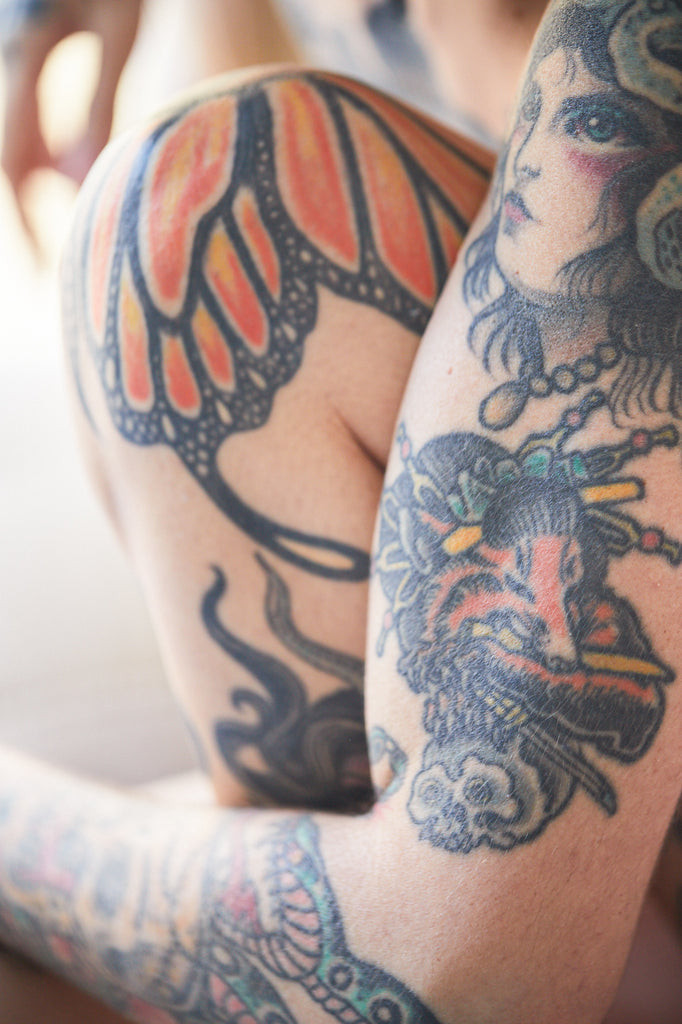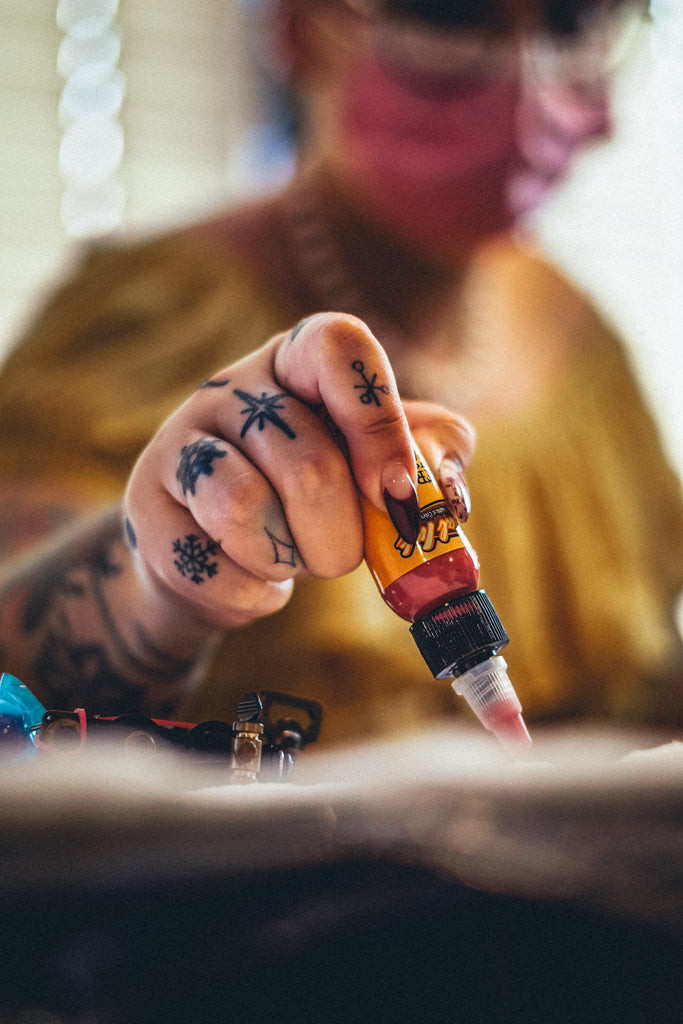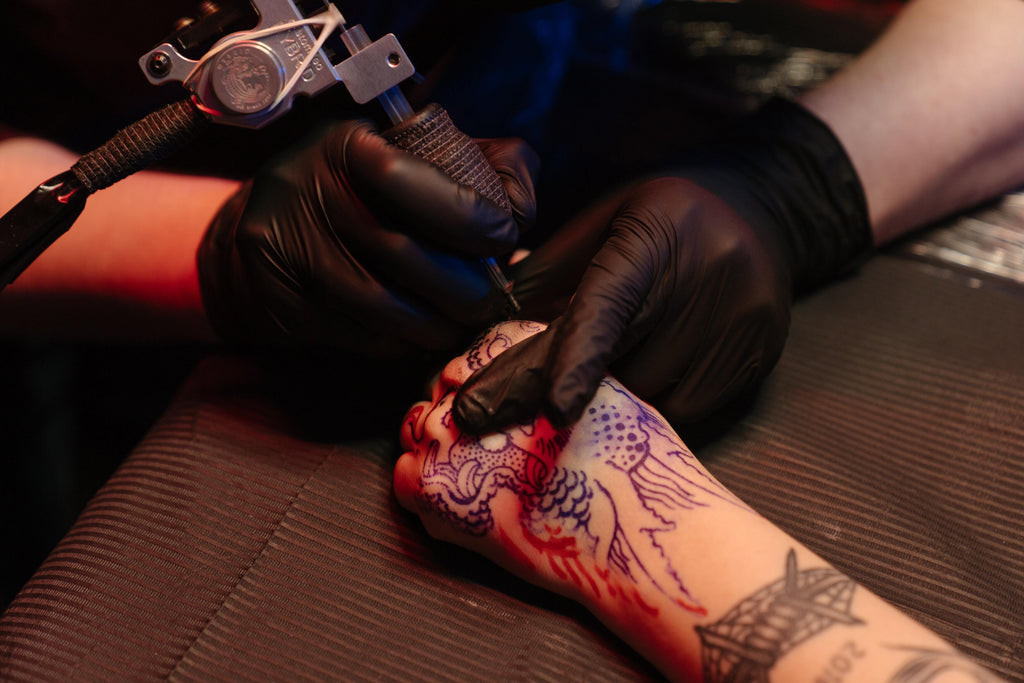Are you experiencing the unsettling feeling of your tattoo lines feeling raised years after getting inked? It’s a common concern in the tattoo community, and at tattooat.com, we’re here to guide you through the potential causes and provide effective solutions to keep your body art looking and feeling its best. From understanding the impact of scar tissue to identifying potential allergic reactions and offering expert care tips, we’ll help you maintain the vibrancy and health of your tattoos for years to come.
1. What Causes a Tattoo to Feel Raised Years Later?
Several factors can contribute to a tattoo feeling raised long after the initial healing process. These range from normal skin reactions to potential complications that require attention. Understanding these causes is the first step toward finding the right solution.
-
Scar Tissue Formation: Tattoos, by their very nature, involve puncturing the skin, which can sometimes lead to scar tissue formation. Even if the scarring isn’t immediately apparent, it can develop over time and cause the tattooed area to feel raised. Thicker lines or areas where the artist applied more pressure during the tattooing process are more prone to this.
-
Allergic Reactions: Although rare, allergic reactions to tattoo ink can occur even years after getting the tattoo. These reactions can cause inflammation and swelling, leading to a raised sensation. Certain colors, particularly red, are more likely to trigger allergic responses.
-
Environmental Factors: Changes in temperature and humidity can also affect the skin around the tattoo. Warmer weather and higher humidity can cause the skin to swell, making the tattoo feel raised. Conversely, dry weather can lead to skin retraction, which can also accentuate the tattoo lines.
-
Skin Conditions: Underlying skin conditions like eczema or psoriasis can sometimes affect tattooed areas, causing inflammation and a raised sensation. These conditions can disrupt the skin’s normal barrier function and make it more susceptible to irritation.
-
Sun Exposure: Prolonged sun exposure without proper protection can damage the skin and potentially cause the tattooed area to become raised. UV radiation can break down collagen and elastin, leading to changes in skin texture and appearance.
2. Is It Normal for a Tattoo to Feel Raised Years Later?
Occasional fluctuations in how your tattoo feels are generally normal, but persistent or worsening raised sensations warrant further investigation. It’s essential to distinguish between temporary changes and potential underlying issues.
-
Temporary Fluctuations: Minor, temporary raised sensations are often attributed to environmental factors or slight skin irritation. These usually resolve on their own without intervention.
-
Persistent Issues: If the raised feeling is constant, accompanied by itching, redness, or other symptoms, it could indicate a more serious problem like an allergic reaction or skin condition.
-
Consulting a Professional: If you’re concerned about a raised tattoo, consult a dermatologist or experienced tattoo artist. They can assess the situation and provide appropriate guidance.
3. How Can Scar Tissue Cause a Tattoo to Feel Raised Years Later?
Scar tissue is a natural part of the skin’s healing process, but its presence can sometimes lead to a raised sensation in older tattoos. Understanding how scar tissue forms and affects the skin is key to managing this issue.
-
Collagen Overproduction: When the skin is injured, it produces collagen to repair the damage. In some cases, the body produces too much collagen, leading to the formation of raised scar tissue.
-
Impact on Tattoo Appearance: Scar tissue can distort the appearance of the tattoo, making the lines appear thicker or uneven. It can also affect the ink’s vibrancy.
-
Minimizing Scarring: While some scarring is inevitable, proper tattoo aftercare can help minimize its formation. This includes keeping the area clean, moisturized, and protected from the sun.
 Close-up of an arm tattoo with visible raised lines, highlighting the texture and potential scar tissue.
Close-up of an arm tattoo with visible raised lines, highlighting the texture and potential scar tissue.
4. What Are the Signs of an Allergic Reaction to Tattoo Ink Years Later?
Allergic reactions to tattoo ink can manifest in various ways, even years after getting the tattoo. Recognizing the signs of an allergic reaction is crucial for prompt treatment.
-
Persistent Itching: One of the most common signs of an allergic reaction is persistent itching in and around the tattooed area.
-
Redness and Inflammation: The skin may become red, inflamed, and swollen. The inflammation might be localized to specific colors within the tattoo.
-
Raised Bumps or Hives: Small, raised bumps or hives may appear on the skin. These bumps can be itchy and uncomfortable.
-
Skin Peeling or Blistering: In more severe cases, the skin may peel or develop blisters.
-
Localized Swelling: The tattooed area may swell, causing the lines to feel raised.
-
Delayed Reactions: Allergic reactions can occur years after getting the tattoo, making them difficult to diagnose.
-
Seeking Medical Advice: If you suspect an allergic reaction, consult a dermatologist or allergist for testing and treatment.
5. How Do Environmental Factors Affect Raised Tattoos Years Later?
Environmental factors like temperature and humidity can significantly impact the skin and potentially cause tattoos to feel raised years later. Understanding these effects can help you take preventive measures.
-
Warm Weather and Humidity: In warm, humid conditions, the skin tends to swell slightly due to increased blood flow and fluid retention. This swelling can make the tattoo lines feel more raised.
-
Cold Weather and Dryness: Cold, dry weather can cause the skin to lose moisture and contract. This contraction can also accentuate the tattoo lines and make them feel raised.
-
Managing Environmental Effects: Keeping the skin moisturized can help mitigate the effects of temperature and humidity changes.
6. What Skin Conditions Can Cause a Tattoo to Feel Raised Years Later?
Certain skin conditions can affect tattooed areas, causing inflammation and a raised sensation. Identifying these conditions and seeking appropriate treatment is essential.
-
Eczema: Eczema is a chronic skin condition characterized by dry, itchy, and inflamed skin. When eczema affects a tattooed area, it can cause the tattoo to feel raised and uncomfortable.
-
Psoriasis: Psoriasis is another chronic skin condition that causes red, scaly patches on the skin. If psoriasis develops in a tattooed area, it can lead to inflammation and a raised sensation.
-
Managing Skin Conditions: Treating the underlying skin condition can help alleviate the symptoms in the tattooed area. This may involve topical creams, medications, or other therapies prescribed by a dermatologist.
7. How Does Sun Exposure Affect Raised Tattoos Years Later?
Sun exposure can damage the skin and potentially cause tattoos to become raised over time. Protecting your tattoos from the sun is crucial for maintaining their appearance and health.
-
UV Radiation Damage: UV radiation can break down collagen and elastin, leading to changes in skin texture and appearance.
-
Fading and Discoloration: Sun exposure can cause tattoo ink to fade or become discolored.
-
Increased Sensitivity: Sunburned skin can become inflamed and sensitive, making the tattoo feel raised and uncomfortable.
-
Preventing Sun Damage: Apply a broad-spectrum sunscreen with an SPF of 30 or higher to protect your tattoos from the sun. Wear protective clothing when possible and avoid prolonged sun exposure.
8. What Are the Best Ways to Treat a Raised Tattoo Years Later?
Treating a raised tattoo depends on the underlying cause. Here are some effective methods for addressing this issue.
-
Moisturizing: Keeping the skin well-moisturized is essential for preventing dryness and irritation. Apply a fragrance-free, hypoallergenic lotion or cream to the tattooed area regularly.
-
Topical Corticosteroids: For mild inflammation or allergic reactions, a topical corticosteroid cream can help reduce itching and swelling. Use as directed by a healthcare professional.
-
Antihistamines: If itching is a prominent symptom, taking an antihistamine can provide relief.
-
Cool Compresses: Applying cool compresses to the tattooed area can help reduce inflammation and soothe irritated skin.
-
Medical Treatments: For more severe allergic reactions or skin conditions, a dermatologist may prescribe stronger medications or recommend other treatments.
-
Laser Therapy: In some cases, laser therapy can be used to reduce scar tissue and improve the appearance of raised tattoos.
9. When Should You See a Doctor About a Raised Tattoo Years Later?
It’s essential to know when to seek medical attention for a raised tattoo. Here are some situations that warrant a visit to the doctor.
-
Severe Itching: If the itching is intense and interferes with your daily activities, consult a healthcare professional.
-
Spreading Redness or Swelling: If the redness or swelling is spreading beyond the tattooed area, it could indicate an infection or severe allergic reaction.
-
Drainage or Pus: Any drainage or pus from the tattooed area is a sign of infection and requires immediate medical attention.
-
Fever or Chills: If you develop a fever or chills along with the raised tattoo, it could indicate a systemic infection.
-
Unresponsive to Home Treatments: If the raised tattoo doesn’t improve with home treatments, seek professional medical advice.
10. How Can tattooat.com Help with Raised Tattoos?
At tattooat.com, we’re dedicated to providing valuable information and resources for tattoo enthusiasts. Here’s how we can help you with raised tattoos.
-
Expert Advice: Our website features articles and guides written by experienced tattoo artists and dermatologists.
-
Product Recommendations: We recommend high-quality skincare products specifically designed for tattoos.
-
Artist Directory: Find skilled tattoo artists in your area who can assess your tattoo and provide expert advice.
-
Community Forum: Connect with other tattoo enthusiasts and share your experiences and tips.
-
Inspiration and Designs: Browse our extensive collection of tattoo designs to find inspiration for your next piece of art.
Experiencing a raised tattoo years later can be concerning, but understanding the potential causes and treatments can help you manage the issue effectively. Remember to prioritize proper tattoo aftercare, protect your skin from the sun, and consult with professionals when needed. Visit tattooat.com for more information, expert advice, and inspiration to keep your tattoos looking their best for years to come. Our address is 1825 SW Broadway, Portland, OR 97201, United States. You can also reach us by phone at +1 (503) 725-3000 or visit our website at tattooat.com. Let tattooat.com be your trusted resource for all things tattoo-related! Discover stunning tattoo ideas, locate talented artists, and gain essential tattoo knowledge – all in one place.
11. Exploring Common Misconceptions About Raised Tattoos
Many misconceptions surround the phenomenon of raised tattoos. Addressing these can help alleviate unnecessary anxiety and promote informed decision-making.
11.1. Misconception: A Raised Tattoo Always Means Infection
A raised tattoo doesn’t automatically indicate an infection. As discussed, various factors like scar tissue, allergies, or environmental changes can cause this. However, if accompanied by redness, pain, pus, or fever, seek immediate medical attention, as these are infection signs.
11.2. Misconception: Only New Tattoos Can Feel Raised
While it’s common for new tattoos to feel raised due to the healing process, older tattoos can also experience this sensation due to delayed allergic reactions or changes in the skin over time.
11.3. Misconception: Moisturizing Will Always Fix a Raised Tattoo
While moisturizing is beneficial for general skin health and can alleviate dryness-related issues, it won’t resolve all causes of raised tattoos. Conditions like allergic reactions or significant scar tissue may require additional treatments.
11.4. Misconception: All Tattoo Inks Are Created Equal
The quality and composition of tattoo inks can vary significantly. Some inks are more prone to causing allergic reactions or fading over time. Choosing reputable artists who use high-quality inks can minimize potential problems.
 A variety of colorful tattoo inks, representing the potential for allergic reactions and the importance of quality.
A variety of colorful tattoo inks, representing the potential for allergic reactions and the importance of quality.
11.5. Misconception: Raised Tattoos Are Always Permanent
Depending on the cause, raised tattoos may not be permanent. Issues like temporary allergic reactions or environmental effects can resolve with appropriate treatment or changes in conditions. Even scar tissue can sometimes be improved with laser therapy or other interventions.
12. The Role of Tattoo Placement in Raised Sensations
The location of a tattoo on the body can influence whether it feels raised years later. Areas with thinner skin or more movement may be more prone to this issue.
12.1. Areas with Thin Skin
Tattoos on areas with thin skin, such as the wrists, ankles, or collarbones, may be more likely to feel raised due to the proximity of the ink to underlying structures and the greater visibility of any changes in skin texture.
12.2. High-Movement Areas
Tattoos on areas with a lot of movement, such as joints, may experience more friction and irritation, potentially leading to inflammation and a raised sensation over time.
12.3. Areas Prone to Scarring
Certain areas of the body are more prone to scarring than others. Tattoos in these areas may be more likely to develop raised scar tissue over time.
12.4. Sun Exposure and Placement
Tattoos in areas that are frequently exposed to the sun, such as the arms or back, may be more prone to sun damage, which can contribute to a raised sensation.
13. Lifestyle Factors and Raised Tattoos
Certain lifestyle factors can also influence whether a tattoo feels raised years later. These include diet, hydration, and overall health.
13.1. Diet and Inflammation
A diet high in inflammatory foods can contribute to systemic inflammation, potentially affecting the skin around tattoos.
13.2. Hydration and Skin Health
Proper hydration is essential for maintaining skin health and elasticity. Dehydration can lead to dry, irritated skin, which may exacerbate the sensation of a raised tattoo.
13.3. Smoking and Skin Damage
Smoking can damage collagen and elastin, leading to premature aging and skin damage. This can make tattoos more prone to feeling raised.
13.4. Overall Health and Immune Function
Compromised immune function can increase the risk of allergic reactions and skin conditions, potentially contributing to a raised tattoo.
14. Tattoo Styles and Raised Sensations
Certain tattoo styles may be more likely to result in a raised sensation due to the techniques used and the amount of ink deposited in the skin.
14.1. Bold Lines and Heavy Shading
Tattoos with bold lines and heavy shading require more ink deposition, which can increase the risk of scar tissue formation and a raised sensation.
14.2. Traditional vs. Fine Line Tattoos
Traditional tattoos, which often use thicker lines and bolder designs, may be more prone to feeling raised compared to fine line tattoos, which use delicate lines and minimal ink.
14.3. Scarification and Raised Tattoos
Scarification, a form of body modification that intentionally creates scars, is designed to produce raised skin. While distinct from traditional tattoos, understanding scarification can provide insights into how the skin responds to intentional injury.
15. The Future of Tattoo Aftercare and Raised Tattoos
Ongoing research and advancements in skincare technology are leading to improved tattoo aftercare practices and products. These innovations may help minimize the risk of raised tattoos in the future.
15.1. Advanced Skincare Formulations
New skincare formulations are being developed with ingredients that promote collagen production, reduce inflammation, and protect against sun damage.
15.2. Laser Technology for Scar Reduction
Advancements in laser technology are making scar reduction more effective and less invasive.
15.3. Personalized Tattoo Aftercare
The future of tattoo aftercare may involve personalized recommendations based on individual skin types, tattoo styles, and lifestyle factors.
 An arm being treated with a laser for scar reduction, representing advancements in tattoo aftercare.
An arm being treated with a laser for scar reduction, representing advancements in tattoo aftercare.
15.4. Nanotechnology in Tattoo Inks
Research into nanotechnology may lead to the development of tattoo inks that are less likely to cause allergic reactions or fade over time. According to research from Portland State University’s Art Department, in July 2025, P provides Y
16. Real-Life Experiences with Raised Tattoos
Hearing from individuals who have experienced raised tattoos can provide valuable insights and reassurance.
16.1. Case Study 1: Allergic Reaction to Red Ink
A 35-year-old woman noticed her red tattoo started feeling raised and itchy several years after getting it. Allergy testing revealed she had developed an allergy to the pigment in the red ink. Topical corticosteroids and antihistamines helped manage the symptoms.
16.2. Case Study 2: Scar Tissue Formation on the Shoulder
A 42-year-old man with a large shoulder tattoo noticed the lines started feeling raised over time. A dermatologist determined it was due to scar tissue formation from the heavy shading. Laser therapy helped reduce the raised sensation.
16.3. Case Study 3: Environmental Sensitivity in a Wrist Tattoo
A 28-year-old woman with a wrist tattoo noticed it felt raised during the winter months when her skin was dry. Consistent moisturizing helped alleviate the sensation.
17. The Psychological Impact of Raised Tattoos
Beyond the physical discomfort, raised tattoos can also have a psychological impact. Addressing these concerns is essential for overall well-being.
17.1. Anxiety and Self-Consciousness
Individuals may feel anxious or self-conscious about the appearance of their raised tattoo, especially if it’s in a visible location.
17.2. Body Image Issues
Raised tattoos can affect body image and self-esteem.
17.3. Seeking Support and Understanding
Connecting with other tattoo enthusiasts and seeking support from healthcare professionals can help individuals cope with the psychological impact of raised tattoos.
18. Maintaining Tattoo Vibrancy Alongside Addressing Raised Sensations
While addressing the raised sensation, it’s equally important to maintain the tattoo’s vibrancy and prevent fading.
18.1. Consistent Sun Protection
Sunscreen is crucial for preventing fading and maintaining the tattoo’s colors.
18.2. Proper Hydration and Skincare
Keeping the skin hydrated and using tattoo-friendly skincare products can help preserve the tattoo’s appearance.
18.3. Avoiding Harsh Chemicals
Harsh chemicals can damage tattoo ink and contribute to fading.
19. Preventative Measures: Reducing the Likelihood of Raised Tattoos
While some causes are unavoidable, preventative measures can minimize the risk of a tattoo feeling raised later in life.
19.1. Choosing Experienced Artists
Experienced artists use proper techniques to minimize trauma to the skin and reduce the risk of scarring.
19.2. Following Aftercare Instructions
Adhering to aftercare instructions is crucial for proper healing.
19.3. Maintaining a Healthy Lifestyle
A healthy lifestyle promotes overall skin health.
20. FAQs About Raised Tattoos Years Later
Here are some frequently asked questions about raised tattoos years later:
20.1. Is it normal for my tattoo to feel raised when I’m sick?
Yes, your tattoo may feel raised when you’re sick due to inflammation and immune system activation.
20.2. Can weather changes affect my tattoo?
Yes, weather changes can affect your tattoo; warmer weather can cause swelling, while colder weather can cause skin retraction.
20.3. What if only certain colors in my tattoo feel raised?
If only certain colors in your tattoo feel raised, it could indicate an allergic reaction to those specific pigments.
20.4. How often should I moisturize my tattoo?
You should moisturize your tattoo regularly, especially after showering, to keep the skin hydrated and prevent dryness.
20.5. Can I use over-the-counter steroid creams on my raised tattoo?
Yes, but use over-the-counter steroid creams sparingly and as directed by a healthcare professional.
20.6. Is laser tattoo removal a solution for raised tattoos?
Laser tattoo removal might be a solution, but it should be considered as a last resort due to potential side effects.
20.7. How can I tell if my tattoo is infected?
You can tell if your tattoo is infected by looking for signs like redness, swelling, pus, pain, and fever.
20.8. Are there specific lotions recommended for tattoos?
Yes, there are specific lotions recommended for tattoos; look for fragrance-free, hypoallergenic options.
20.9. Can certain medications cause my tattoo to feel raised?
Yes, certain medications can cause your tattoo to feel raised, especially those that affect the immune system or cause fluid retention.
20.10. How can I find a dermatologist who specializes in tattoos?
You can find a dermatologist who specializes in tattoos by asking your tattoo artist for a referral or searching online directories.

